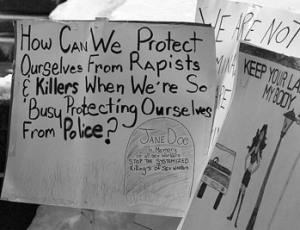Mark Bennett is a criminal defense lawyer in Houston who, as he says in the text below, is unafraid to defend sex workers. I first linked his blog just over a year ago in “The Truth About ‘The Truth About…’“, then more recently in “The Spiral of Absurdity“. But in December he wrote a series of “tweets” which impressed me so much, I asked him to turn them into a guest post; this column is the result.
An adult’s body belongs fully to that adult. It does not belong to his parents, to her husband, or to the government. If something—including your body—belongs to you, you can do what you want with it, as long as what you do doesn’t hurt (or create an unjustifiable risk of hurting) other people. If you cannot do what you want with it (without interfering with others’ rights), a thing does not belong to you. You have at best a limited license.
 It is true that the law and society treat us as having a limited license to our bodies. In most American states you can’t legally smoke marijuana, you can’t hire someone to help you end your own life, and you can’t have sex with someone for money. It has not always been the case that a woman’s body belongs to her, even aside from the claims upon it by government; historically, women’s bodies have effectively belonged to their male kin, who were honor-bound to protect their purity until they married, and to their husbands thereafter. There are still segments of society in which this is the case. Witness, for example, “purity balls” at which adolescent girls pledge that they will preserve their virginity until married and fathers pledge that they will protect their daughters’ purity. I do not claim to be a feminist, yet it strikes me as creepy that a father should take such a proprietary interest in what his grown daughter does with her vagina.
It is true that the law and society treat us as having a limited license to our bodies. In most American states you can’t legally smoke marijuana, you can’t hire someone to help you end your own life, and you can’t have sex with someone for money. It has not always been the case that a woman’s body belongs to her, even aside from the claims upon it by government; historically, women’s bodies have effectively belonged to their male kin, who were honor-bound to protect their purity until they married, and to their husbands thereafter. There are still segments of society in which this is the case. Witness, for example, “purity balls” at which adolescent girls pledge that they will preserve their virginity until married and fathers pledge that they will protect their daughters’ purity. I do not claim to be a feminist, yet it strikes me as creepy that a father should take such a proprietary interest in what his grown daughter does with her vagina.
To the avowed feminist, the claim of male ownership (transferred from the father to the husband, with no intermediate ownership) of female sexuality must be the height of patriarchy. Yet there’s a wide gap between rejection of male ownership of female sexuality, and acceptance that everyone’s own sexuality belongs to him or her, to do with what he or she will as long as it doesn’t hurt (or create an unjustifiable risk of hurting) other people. This gap is illustrated by the feminist position (not universal, but much broader than just the PIV-is-rape crowd) that sex work should be criminalized. Sex work is the explicit exchange of sexual services for value (as opposed to the implicit exchange of sexual services for value, which we just call “sex”). Criminalization is the use of violence (including the threat of violence) to compel people to refrain from doing something. This is what libertarians call “the gun in the room”: without violence, government would be powerless to compel anything, so those who support criminalization are using violence (through proxies) to force women not to engage in explicit sexual commerce. The argument against decriminalizing sex work depends on people possessing a thing that they cannot be permitted to sell. But if a person possesses something that she could not (assuming a willing buyer) sell, she doesn’t own it. By criminalizing sex work we teach people that their sexuality is not their own, but subject to society’s—government’s—license. If male ownership of women’s sexuality was bad, government (male-created and mostly male-run) ownership of women’s sexuality is worse.
I write as a criminal-defense lawyer who represents sex workers, as a libertarian, and most importantly as the father of a girl. ”Would you have sex for money, Mark? Would you be happy about it if your daughter chose to?” I reckon not. But each of us experiences life’s many facets differently; I know women who derive satisfaction from sex work, and I’m not prepared to force my own tastes on other people at gunpoint. Outlawing sex work makes women’s sexuality (most sex workers are women) the property of the community. There would be a certain internal logic in this if you were a PIV-is-always-rape feminist: you would see in the sex worker a woman who thinks she is honestly exchanging sexual services for money, but who a) suffers from false consciousness; and b) is harming your cause by promoting a culture of penetrative sex, and therefore rape. (You would also have written off this post, on seeing my name, as mansplaining.) By the same token, if you were a religious fundamentalist you might think that sex workers were calling the judgment of God down upon society, and feel that using violence to stop sex work was justified to prevent a greater harm.
 But I suspect that most people fall somewhere between these two extremes. If they view sex work as harmful, most people see it as harmful to the sex workers, harmful to individual relationships, or a symptom of a more severe disease. When sex work is harmful to sex workers, the harm is often due to criminalization, which drives the criminalized behavior underground, where it’s easier for violent people (including police) to harm those engaging in it. Even absent criminalization, sex workers would sometimes put themselves into danger, but the risk of harm to sex workers cannot justify using violence to stop them. When sex work is harmful to individual relationships, that’s the fault of the people in the relationships, and not of sex work; using violence to stop sex work because some relationships are troubled is an irrational overreaction. And though I do think that society is sick, sex work (which has always existed in all societies) is not a symptom. Even if sex work were a symptom of a societal disease, applying violence to sex workers would not cure it; on the contrary, it would just drive the symptom underground.
But I suspect that most people fall somewhere between these two extremes. If they view sex work as harmful, most people see it as harmful to the sex workers, harmful to individual relationships, or a symptom of a more severe disease. When sex work is harmful to sex workers, the harm is often due to criminalization, which drives the criminalized behavior underground, where it’s easier for violent people (including police) to harm those engaging in it. Even absent criminalization, sex workers would sometimes put themselves into danger, but the risk of harm to sex workers cannot justify using violence to stop them. When sex work is harmful to individual relationships, that’s the fault of the people in the relationships, and not of sex work; using violence to stop sex work because some relationships are troubled is an irrational overreaction. And though I do think that society is sick, sex work (which has always existed in all societies) is not a symptom. Even if sex work were a symptom of a societal disease, applying violence to sex workers would not cure it; on the contrary, it would just drive the symptom underground.
I think that most people have a visceral moral reaction against sex work, which they rationalize and don’t worry about a lot about because they don’t consider the downside of criminalization. I’d like to ask those people: could we try treating a woman’s sexuality as her own property, to keep, give, rent, or sell as she will? Let’s try, just for a generation or two, teaching our daughters that they are sovereign over their own bodies.
